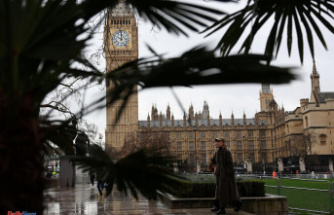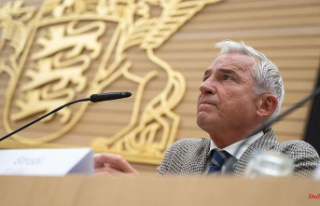Anger is brewing in Tunisia, before, perhaps, a new leaden screed? Several hundred people demonstrated on Saturday, July 22, in the Tunisian capital against the draft new Constitution submitted to a referendum on Monday by President Kaïs Saïed, whose protesters demanded his immediate departure. After crossing several red lines, the one nicknamed "Robocop" hopes for the realization of his political vision at the ballot box, consecrating the presidential hyper power.
More than 9 million Tunisians are expected to vote on a new fundamental law in a referendum that has a strong chance of being adopted. Kaïs Saïed's project provides for a president exercising executive power, supported by a head of government whom he appoints and can dismiss without going through Parliament, whose role is greatly reduced. The president will be able, among his other prerogatives, to table bills and dissolve the Assembly of People's Representatives (ARP). For their part, the deputies will share their legislative power with regional assemblies, whose appointment of members and role remain undefined.
In other words, the Head of State will enjoy vast prerogatives without having to render accounts, marking a break with the hybrid parliamentary system established in 2014. In parallel, the political scientist and specialist in Tunisia, Aude-Annabelle Canesse (AAC Policy Advisory) , explains to L'Express the importance of looking at this Constitution under another prism: "It is part of the struggle that has been going on for two years between the presidential power and the Islamists - represented by the Ennahdha party, which arrived in head of the legislative elections in 2019." Unsurprisingly, the Islamist-inspired formation - accused by part of the population of having blocked the country - called for a boycott of the ballot, citing an "illegal process" and a lack of consultation.
For these critics, this text could change the face of Tunisian politics and put an end to the legacy of the Arab Spring (2011), which brought democracy to this small Maghreb country in its wake. The opposition and various NGOs, which have mobilized in recent months against the policy of Kais Saïed, have also called for a boycott of the referendum, saying they fear the return to a "dictatorial" regime like that of Zine El Abidine Ben Ali, overthrown by the 2011 Revolution.
In their sights, article 55 which stipulates that "the exercise of rights and freedoms may be limited by law or in the name of national defense, public security, public health, the protection of the rights of 'others or public mores'. The version of July 8 adds, here again, the need to include such restrictions on freedoms and rights within a "democratic framework" but greatly worries civil society. It considers the guarantees given on the independence of the judiciary to be insufficient.
Also, the opponents of this Constitution point the finger at the overtly religious bases of the text. To this, Aude-Annabelle Canesse brings a nuance: on the theological level, the new Constitution does not create a real break with the Arab Spring, it draws much inspiration from previous texts." Regarding Article 5 which reformulates the relationship between Islam and the State, saying that "Tunisia belongs to the Islamic community (oumma)," strongly criticized, it was already found, according to the political scientist, "in several pieces" in the previous Constitutions of 1959 and 2014.
According to the specialist, the Constitution puts a stop to certain parliamentary arrangements which have corrupted the political life of the country. “While they did a lot before, the deputies will no longer be able to change parliamentary bloc and there is provision for a withdrawal of the parliamentary mandate in the event of an infringement. These are interesting elements and which do not show a drift”, explains- she.
Since July 25, 2021, the president has assumed full powers by dismissing the Prime Minister and suspending Parliament, which he finally dissolved at the end of March, shaking the young Tunisian democracy. The one who has long been a UFO on the political scene has dismantled several constitutional bodies, such as the Anti-Corruption Authority or the Judicial Council.
To the political changes is added an economy at a standstill, with a country on the verge of bankruptcy. With the war in Ukraine, the price of bread doubled. However, these political and economic uncertainties have not put the Tunisian population to sleep, which remains active and mobilized. "Civil society is watching. People demonstrate and remain very attentive, we are not at the time of Ben Ali", resumes Anne-Annabelle Canesse. Will this mobilization be seen at the polls? "The more elections that have taken place in the last ten years, the more the participation rate has dropped," she concludes. The answer on Monday.












